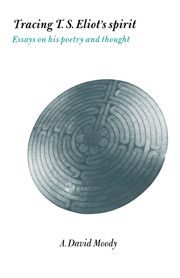Book contents
Preface
Published online by Cambridge University Press: 05 November 2011
Summary
In my own mind the title of this book is Tracing T. S. Eliot's Peregrinations. I have heeded the advice of those who should know that to have the polysyllabic peregrinations in the title would do the book no good. Still its unique complex of meanings makes it an indispensable word in connection with Eliot; and one which, just because it is not in common use, is all the more apt for Eliot's uncommon life in thought and poetry. So long as his work is current we will need to keep the word current. The meanings of peregrination start from the ordinary ‘transplanting into another country’, as Eliot transplanted himself from his native America to England; but when we come to ‘travelling into foreign lands’ the sense becomes metaphysical, Eliot's travels having been mainly into foreign regions of the mind and spirit; that connects with the further sense of ‘travelling as a religious pilgrim’ in quest of places especially devoted to the life of the spirit; and finally we are brought to the general idea of ‘man's life on earth viewed as a sojourn in the flesh’, with the implication that the spirit belongs elsewhere. Thus the whole word fits Eliot perfectly. In Caesar's Rome peregrine was applied to visiting aliens. In Christian times it became the word for pilgrims for whom Rome represented the eternal city of God.
- Type
- Chapter
- Information
- Tracing T. S. Eliot's SpiritEssays on his Poetry and Thought, pp. xiii - xxiiPublisher: Cambridge University PressPrint publication year: 1996



